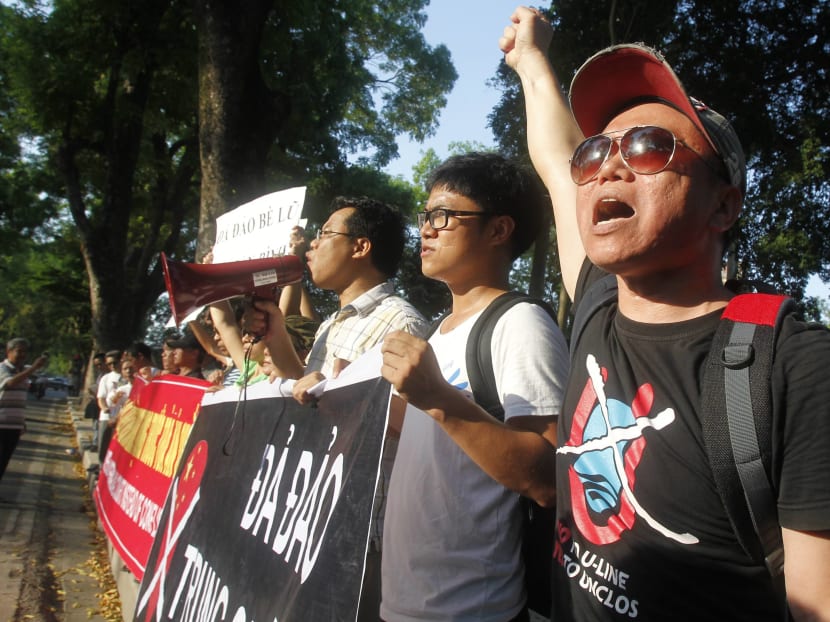US, China trade barbs over South China Sea dispute
BEIJING — China hit back at the United States over the disputed waters of the South China Sea yesterday, after US Secretary of State John Kerry said recent Chinese moves in the resource-rich waters were “provocative”.

Protesters hold a placard which reads "Down with Xi Jinping's gang" during an anti-China protest in front of the Chinese embassy in Hanoi yesterday. Photo: Reuters
BEIJING — China hit back at the United States over the disputed waters of the South China Sea yesterday, after US Secretary of State John Kerry said recent Chinese moves in the resource-rich waters were “provocative”.
In remarks he made to Singapore’s Foreign Minister K Shanmugam, who is visiting Washington DC, Mr Kerry also said the US was deeply concerned by China’s “aggressive” behaviour.
Tensions rose last week after China moved a giant oil rig into an area also claimed by Vietnam. Each country accused the other of ramming its ships near the disputed Paracel Islands in the South China Sea. China claims almost the entire sea, rejecting claims to parts of it by Taiwan and Association of Southeast Asian Nations (ASEAN) members Vietnam, the Philippines, Malaysia and Brunei.
“He (Mr Kerry) said China’s introduction of an oil rig and government vessels in waters disputed with Vietnam was provocative,” US State Department spokeswoman Jen Psaki said, referring to a phone call between Mr Kerry and Chinese Foreign Minister Wang Yi. “He urged both sides to de-escalate tensions, ensure safe conduct by their vessels at sea and resolve the dispute through peaceful means in accordance with international law.”
China’s foreign ministry said there certainly had been provocative moves in the South China Sea, but that Beijing was not the guilty party and repeated that it was the fault of the US for encouraging such behaviour.
“We hope the US can carefully reflect — if it really hopes for the Pacific Ocean to be peaceful, what kind of role does it actually want to play?” said spokeswoman Hua Chunying. She added that Mr Wang urged Mr Kerry to “objectively and fairly” look at the issue and “act and speak cautiously”.
Mr Kerry told Mr Shanmugam the US was deeply concerned by China’s “aggressive act”. “We are particularly concerned — all nations that are engaged in navigation and traffic in the South China Sea (and) the East China Sea are deeply concerned about this aggressive act,” he said on Monday.
“We want to see a code of conduct created; we want to see this resolved peacefully through the Law of the Sea, arbitration (and) any other means, but not direct confrontation and aggressive action,” Mr Kerry added, according to the State Department’s transcript of his comments.
Mr Shanmugam echoed Mr Kerry’s desire for ASEAN and China to agree on a code of conduct for the South China Sea — an effort to help manage the territorial disputes. “We need a situation where parties resolve their disputes and differences in a way that’s acceptable to all,” said Mr Shanmugam.
Talks on the code of conduct have made little progress since China agreed in July to start discussions. Beijing says the issue should be resolved via direct talks between the parties concerned and has bristled at what it sees as unwarranted US interference.
Speaking to ASEAN leaders on Sunday, Prime Minister Nguyen Tan Dung said Vietnam had acted with “utmost restraint” and used dialogue to ask China to remove the rig. He said China was slandering his country and committing dangerous violations. But the communique issued at the end of the ASEAN summit had no criticism of China.
Vietnamese workers protested at Chinese-owned factories yesterday, as anger flared at Beijing’s deployment of the oil rig. Vietnamese and Chinese ships had again used water cannons on each other on Monday, said Vietnamese state media. Ms Hua would not confirm or deny the new face-off, saying China was urging Vietnam to “end its provocative actions”. AGENCIES








